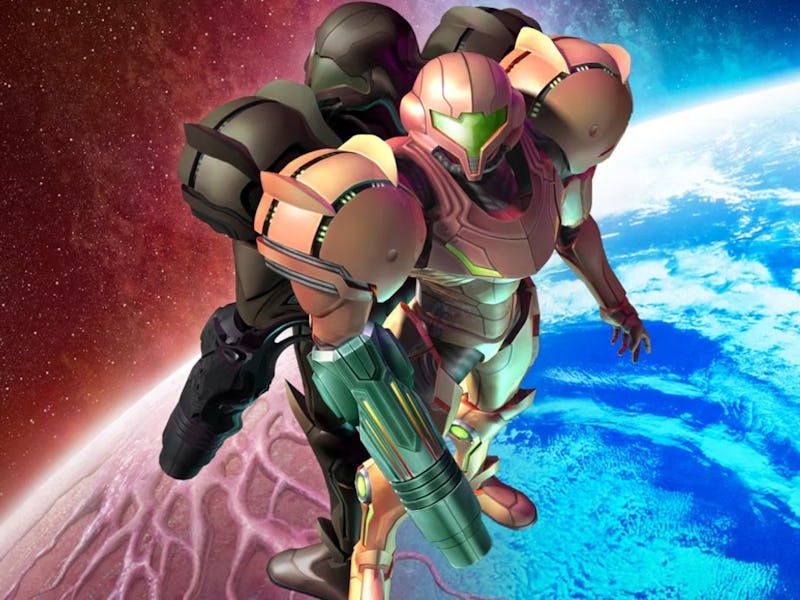15 Years Ago, Nintendo Perfected the Video Game Trilogy
The legendary bounty hunter can’t be beat.

If there’s one thing the video game industry loves, it’s trilogies. From Mass Effect and The Witcher to even Final Fantasy 7 Remake, some of the most beloved game series of all time have been doled out in three parts. It’s easy to see why the format is so popular as it lets developers draw out a story, and have extra time to make each entry feel new and different. What might surprise you, though, is that the quintessential video game trilogy lies on, of all systems, the Nintendo Wii. The original Metroid Prime was a near-perfect video game, but fifteen years ago Nintendo wrapped up the Prime trilogy and put it in one package on the Wii, making it more obvious than ever that Metroid has the golden answer on how to craft a three-part experience.
To talk about the trilogy at large, of course, we have to tackle just why Metroid Prime is such a pivotal, important video game. Prime is perhaps the best translation we’ve ever seen of a 2D game into a 3D one, even more so than Mario or Zelda. With Metroid Prime, released on the GameCube in 2002, Retro Studios effectively transferred the tone, storytelling style, and gameplay formula of the series into something that felt wildly innovative and new.
Metroid Prime is a masterclass in mood and aesthetic, having players creep down eerie hallways and abandoned ancient facilities, while Samus’ face reflects in the glass of her visor and breath fogs it up. Every piece of visual and sound design in Metroid Prime feels expertly tuned to add to the game’s sense of quiet unease, like there’s something awful just waiting around every corner. It’s essentially a horror game that doesn’t need to rely on the typical tropes of the genre, like gore or jump scares.
But layered on top of that is Prime’s gameplay systems, which masterfully tie into those narrative and aesthetic themes. At their core, Metroid games are about discovery, piecing together your way through planets that want nothing more than to eliminate Samus. Retro Studios tied that sense of discovery to every facet of Metroid Prime — through Samus’ scanner that can give you bits of story and tips on how to proceed, through the unlockable skills and items that let you reach new parts of the world, and how the game relies on context clues rather than tutorializing everything.
There’s not a single part of Metroid Prime that wasn’t given thought to how it ties into the game’s overall vision. Because of that, it’s little surprise that the next two games don’t break that formula, but rather put a twist on it. What’s fascinating about Metroid Prime 2: Echoes and Metroid Prime 3: Corruption, however, is that each game puts an emphasis on a different part of Metroid.
Metroid Prime’s scanner is an ingenious piece of gameplay that’s tied directly into the narrative and them, while still serving a mechanical purpose.
Echoes doubles down on puzzle-solving and crafts a fantastic world that requires players to piece things together — while Corruption leans into the action and shooting, giving Samus a deadly new alter ego to contend with.
That’s exactly what makes the Metroid Prime Trilogy so compelling, the whole thing is like a deconstruction of Metroid and its legacy. The first game interrogates the influence of the Metroidvania design and how to translate that out of 2D, the second game looks at puzzles and how that can be tied to narrative, and the third game experiments with how a bigger action focus can still retain the heart of Metroid. It’s a winning blend that makes the Metroid Prime Trilogy some of the most introspective and thoughtful games out there.
Metroid Prime 4’s existence is more interesting because of that fact as well. We still know very little about the fourth entry, but Retro Studios perfectly packaged the Prime trilogy, and how does a new game fit into that after 15 years? There’s no doubt that Metroid Prime 4 will be good, but the bigger question is what the game hopes to achieve thematically, if it’ll similarly work as a deconstruction of the series or a step into something brand new.
The only real disappointment of the Metroid Prime Trilogy is that it’s only playable in a complete form on the Nintendo Wii — not having the whole package on Switch is practically a crime.